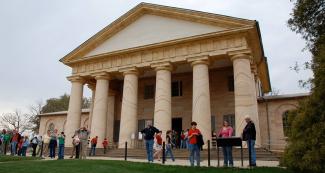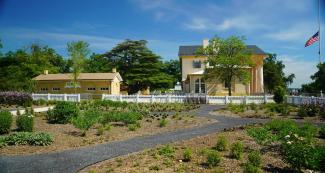The Business Case for Redesignating Arlington House As a National Historic Site

Photo by NPS/Rachel Hendrix, 2018 / Public domain
Executive Summary
A united group of descendant family members from both those who were enslaved and free at the Arlington House Plantation, presently named for its connection to Robert E. Lee, is calling for an updated name that reflects the fullness of stories connected to the site. Because this space is managed by the National Park Service, Congressional action is needed to redesignate Arlington House. This name change is inclusive of all the history being curated and shared by the National Park Service with the public. Having the only authority to act in this matter, Congress should redesignate the Arlington House, the Robert E. Lee Memorial as the Arlington House National Historic Site.
In recognizing the more inclusive history of Arlington House, Congress can provide leadership in nurturing the healing of painful history in ways that speak truth and reconciliation to the current polarized moment. This redesignation will also deepen and enhance the economic opportunities possible when people of color feel welcomed into previously exclusionary spaces.
Arlington House is a National Park Service managed site that overlooks the nation’s capital and the graves of those who have lost their lives protecting and serving our country. It should be a site that is appreciated and attractive to all visitors because it offers an opportunity to expand our knowledge and provide a better understanding of our nation’s history.
The Opportunity

Photo by NPS/Terry Adams, 2008 / Public domain
There were more than 327 million visits to U.S. national parks in 2019. However, surveys commissioned by the National Park Service to see how different population groups related to the National Parks found that, collectively, minorities made up just over 20 percent of the visitors to national parks, despite the fact that they make up more than 40 percent of the U.S. population. The complex history of Arlington House has, in the past, not made it an accessible cultural tourism destination for the millions of Americans whose histories of colonialism, enslavement, and oppression remain to be fully understood and addressed in public spaces.
Robert E. Lee’s military responsibilities greatly restricted his time at the plantation house, a property owned by his wife Mary (he lived there for 8 years, and never owned the land). Lee’s history at the site cannot be diminished and should be told in its entirety. The history of Lee and the Civil War at Arlington House are important chapters that must be taught. However, they are no more important than the longer history and incredible stories that are overlooked of the enslaved people who built the house, lived here, nurtured hopes and dreams, protected the house during the Civil War and made it run, and persevered through and beyond enslavement.
Those rediscovered stories, as reflected in recent archaeological discoveries by the National Park Service of items found buried below the South Slave Quarters where the Gray family lived, now also include a powerful example of reconciliation. Lee is part of the history at Arlington house, but he is not the history at Arlington House. After 160 years, descendant family members whose ancestors were from both enslaved and free families at the Arlington House Plantation were given the opportunity to meet one another for the first time in 2021. Rich and personal facilitated conversations fostered the creation of a “Family Circle” in which members shared hopes for the future. Together, they decided to raise their collective voices to tell a more inclusive history of the Arlington House Plantation in a variety of ways. At the top of the list of the Family Circle’s unified priorities is the redesignation of the site. With bipartisan House and Senate sponsors, the Family Circle helped craft a 180-word joint resolution to redesignate the site as Arlington House National Historic Site.
The Solution

Photo by NPS/AL, 2021 / Public domain
In 2020, the National Park Service completed a renovation and rehabilitation project for the Arlington House, the Robert E. Lee Memorial (ARHO), underwritten by a generous $12.35M gift from David M. Rubenstein. In a Washington Post opinion editorial (OpEd) Mr. Rubenstein stated that:
“The Robert E. Lee Memorial was portrayed as a way to honor Lee’s post-Confederacy efforts toward national reconciliation. ... That aim may have been well-intended at the time, but that was then. Today, we live in a time when symbols of racial intolerance need to be removed – and the sooner the better. ... Arlington House is a historic home; it should not be torn down. Historic sites, as opposed to pseudo-historic monuments, have value in teaching us about the past – the good and the bad. Congress should act quickly to redesignate the building, whether simply as Arlington House, Arlington Cemetery House, Memorial House or any other name that does not offend Americans and helps remind us of the many patriots who have given the last full measure of devotion to their country.”
In a September 2022 Washington Post OpEd, members of the Family Circle wrote:
“The National Park Service’s recent renovations to Arlington House restored the mansion and added as much information as possible about those enslaved there, for which we are grateful. However, there is still work to be done to remember those forgotten stories. As a first step, we need to acknowledge the intertwinement of the lives of those who lived at Arlington House and those who were enslaved there, and we believe renaming the site to be more inclusive is a step in the right direction.”
The same month, the National Park Service offered testimony in a Senate subcommittee hearing stating:
“The Department of the Interior supports this redesignation. ... As the stewards of Arlington House, the NPS is committed to telling stories inclusive of multiple historical perspectives and grounded in current research. The renaming of the site as a national historic site ... is consistent with NPS efforts to tell the full history of Arlington House and the people who built, maintained, and resided on the property.”
In April 2023, a one-of-a-kind reunion took place. Approximately 100 Arlington House descendant family members, whose ancestors were either enslaved or enslavers, gathered for a three-day reunion that was called “Finding Our Voice.” This was the first opportunity for most descendants to meet in person. A public program was held at the Lee Memorial that was attended by more than 175 people that received media attention and raised awareness. This work by the Family Circle is both emotional and difficult. It is an example for how our country can begin to repair itself and to heal over some of the division that we've had for so long. The descendant families strongly support the redesignation of Arlington House, the Robert E. Lee Memorial to Arlington House National Historic Site, a name that embraces the full history.
Congressional action is needed to redesignate Arlington House so that it is inclusive of all the history being curated and shared by the National Park Service with the public. Having the only authority to act in this matter, Congress should redesignate the Arlington House, the Robert E. Lee Memorial to Arlington House National Historic Site. An online petition has been established that is growing and letters are being sent to elected officials to seek help and support.
By embracing a set of values and concepts that include: Honesty, Holistic, Dialogue, Honor, and Accountability, this redesignation reflects NPS’ ongoing efforts to make our Nation’s parks more welcoming and desirable to all visitors who want to learn more about our Nation’s history. Redesignation would help NPS fulfill its mission:
“to preserve unimpaired the natural and cultural resources and values of the National Park System for the enjoyment, education, and inspiration for this, and future, generations.”
